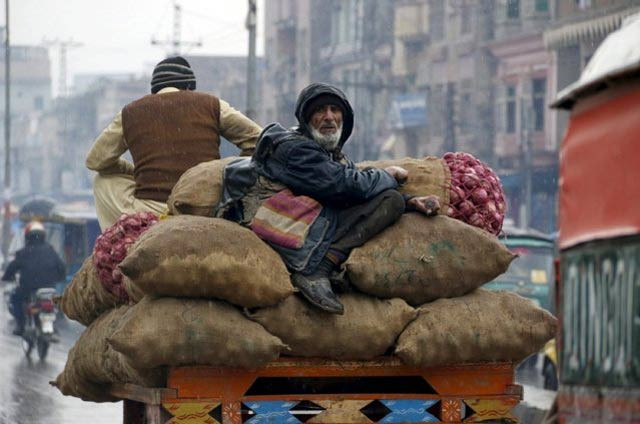Inflation jumps to two-and-a-half-year high at 5.02%
CPI increases following surge in cost of perishables

PHOTO: REUTERS
Annual inflation measured by the Consumer Price Index (CPI), which captures prices of 481 commodities in urban centres, stood at 5.02% in May compared to the same month of last year.
Govt promises more relief for exporters in budget
It was the highest level since October 2014 when the key index surged 5.8%. Since then, the index had stood below 5%.
The May inflation reading exceeded analysts’ expectations of a 4.5% spike. Still, the average inflation for the current fiscal year 2016-17 will stay below 5%, lower than the official target of 6%.
Average inflation during the first 11 months (July-May) of FY17 remained at 4.18%, according to the PBS.
Inflation projections of the International Monetary Fund (IMF) and the State Bank of Pakistan (SBP) are also below the target level. However, a surge in commodity prices is expected to push the inflation up in coming months - a concern the central bank has also expressed in its latest monetary policy announcement.
Going forward in fiscal year 2017-18, the current trend of rising incomes, surge in imports and accelerating credit flow to the private sector were expected to increase the CPI inflation, the SBP noted. Its Monetary Policy Committee kept the policy rate unchanged at 5.75% for June and July 2017.
The central bank has so far resisted the temptation for increasing the interest rate, which remains close to historically low levels. Analysts hope the SBP’s decision to keep the key policy rate unchanged will ensure price stability in the market.
It will also keep the interest cost of government borrowings low as the federal government has once again started borrowing heavily after its tax and non-tax revenues fell short of annual targets.
Core inflation, measured by excluding volatile energy and food prices, remained stable at 5.5% last month, showed the PBS data.
In the Economic Survey 2016-17, the Ministry of Finance has warned of a surge in inflation in coming months.
“Increasing oil and commodity prices remain a concern” in a global atmosphere of surge in commodity and oil prices, according to the survey report. It added the upward movement would affect domestic inflation.
The government hopes that due to increase in agriculture production, sufficient food supplies, stable exchange rate and effective monetary policy, the inflation is expected to stay below next year’s target of 6%.
In May, there was an increase in the commodity groups of food, beverages, health and education, which pushed the annual inflation above 5%.
Overall prices of perishable food items increased 18.1% on an annualised basis. This was also because of increase in demand ahead of Ramazan, which indicated the failure of price control mechanisms.
Prices of potatoes, tomatoes, eggs, fresh fruits, rice, fresh vegetables and pulses increased in the range of 12% to 70%. Maximum increase was in the prices of potatoes.
Despite tax-free system, renewable energy tariffs are high in Pakistan
Compared to this, prices of non-perishable food items rose about 2.4%.
Average prices of drugs and medicines increased over 20%, which also pushed the health group inflation index to 13.5%. The cost of education increased over 11%, mainly because of new taxes in the 2016 budget. House rent rose almost 7% in May.
Published in The Express Tribune, June 2nd, 2017.
Like Business on Facebook, follow @TribuneBiz on Twitter to stay informed and join in the conversation.



















COMMENTS
Comments are moderated and generally will be posted if they are on-topic and not abusive.
For more information, please see our Comments FAQ